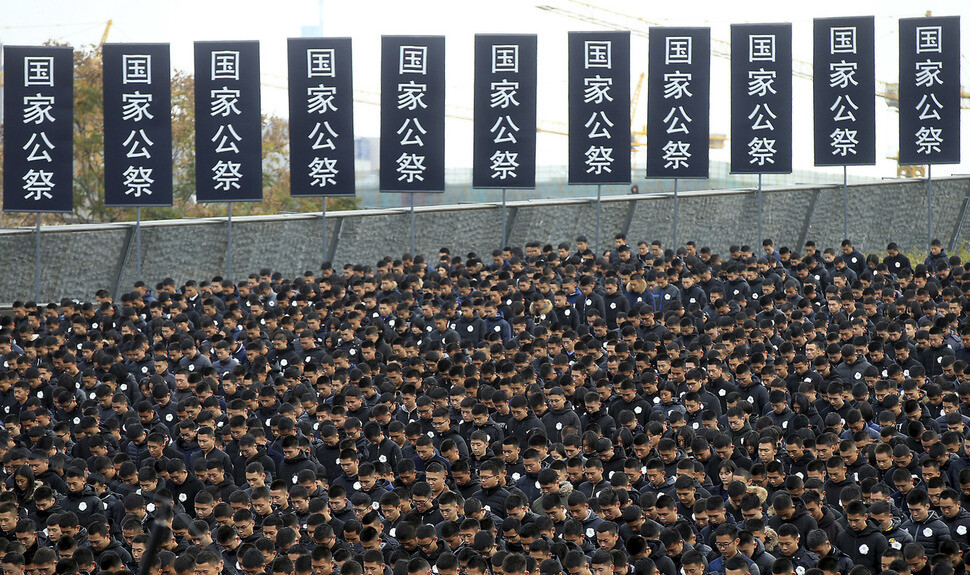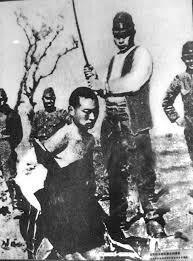hankyoreh
Links to other country sites 다른 나라 사이트 링크
China observes 80th anniversary of Nanjing Massacre

“Highest Jinling [Nanjing’s former name] . . . I will never forget.” Eighty young people were dressed in white shirts and dark blue pants with black flowers pinned to their chests as their clear voices recited the lines of the “peace declaration.” A somber crowd of 10,000 was present for the national day of remembrance on Dec. 13 at a memorial for victims of the Nanjing Massacre in China’s Jiangsu Province. Among those dressed in black with white flowers on their chests was President Xi Jinping. Citizens and mourners observed a moment of silence at 10 am as sirens rang out throughout Nanjing.
The capital city of the Kuomintang government 80 years ago, Nanjing endured terrible carnage. Japan, started the Sino-Japanese War in July 1937, occupying Shanghai that November before seizing Nanjing on Dec. 13. For six weeks, its troops massacred people, committed sexual assaults, and set fire to buildings; according the Chinese government, an estimated 300,000 Chinese were killed.
The Japanese troops fired indiscriminately, not only against captives but also members of the public, and engaged in acts of bayonet practice, decapitation contests, and live burial of victims. Exhibits at the memorial opened with the day’s events offer various records of the unspeakable. In his novel “A Leaf in the Storm,” the Chinese writer Lin Yutang, who lived through the period, wrote, “Not until now, since God created man, had human eyes seen laughing soldiers throw a baby into the air and catch it expertly on the point of a sharp bayonet as it fell and call it sport.”

In Japan, the massacre is officially referred to only as the “Nanjing incident.” Japanese commanders stationed in Nanjing who directly took part in the massacre were sentenced to death in trials held in 1946. Amid a general right-wing shift in the political environment Japan, some politicians now deny the slaughter took place at all.
After the war, China declared itself the victor and refused indemnity from Japan. The issues of Japan’s responsibility for the war and its victims remain topics of denunciation. In an AFP interview, Peking University professor Liang Yunxiang was quoted as saying Beijing has “kept wartime memories alive as leverage against Japan in modern-day disputes such as maritime territorial squabbles.”
The state-run China Daily newspaper also reported on Dec. 13 that Chinese authorities have decided to build a center in Shanghai to commemorate the International Military Tribunal for the Far East (Tokyo War Crimes Tribunal). With the center set to include exhibits of archival materials related to the tribunal, it is expected to serve alongside the Nanjing massacre memorial as one of two major centers for remembering Japan’s past aggressions. Cheng Zhaoqi, head of the Center for Tokyo Trial Studies at Shanghai Jiao Tong University, said city government officials in Shanghai were “currently at the stage of selecting a suitable site.”
By Kim Oi-hyun, Beijing correspondent
Please direct questions or comments to [english@hani.co.kr]

Editorial・opinion
![[Editorial] Penalties for airing allegations against Korea’s first lady endanger free press [Editorial] Penalties for airing allegations against Korea’s first lady endanger free press](https://flexible.img.hani.co.kr/flexible/normal/500/300/imgdb/original/2024/0502/1817146398095106.jpg) [Editorial] Penalties for airing allegations against Korea’s first lady endanger free press
[Editorial] Penalties for airing allegations against Korea’s first lady endanger free press![[Editorial] Yoon must halt procurement of SM-3 interceptor missiles [Editorial] Yoon must halt procurement of SM-3 interceptor missiles](https://flexible.img.hani.co.kr/flexible/normal/500/300/imgdb/child/2024/0501/17145495551605_1717145495195344.jpg) [Editorial] Yoon must halt procurement of SM-3 interceptor missiles
[Editorial] Yoon must halt procurement of SM-3 interceptor missiles- [Guest essay] Maybe Korea’s rapid population decline is an opportunity, not a crisis
- [Column] Can Yoon steer diplomacy with Russia, China back on track?
- [Column] Season 2 of special prosecutor probe may be coming to Korea soon
- [Column] Park Geun-hye déjà vu in Yoon Suk-yeol
- [Editorial] New weight of N. Korea’s nuclear threats makes dialogue all the more urgent
- [Guest essay] The real reason Korea’s new right wants to dub Rhee a founding father
- [Column] ‘Choson’: Is it time we start referring to N. Korea in its own terms?
- [Editorial] Japan’s rewriting of history with Korea has gone too far
Most viewed articles
- 160% of young Koreans see no need to have kids after marriage
- 2Presidential office warns of veto in response to opposition passing special counsel probe act
- 3[Editorial] Penalties for airing allegations against Korea’s first lady endanger free press
- 4Hybe-Ador dispute shines light on pervasive issues behind K-pop’s tidy facade
- 5S. Korea “monitoring developments” after report of secret Chinese police station in Seoul
- 6Months and months of overdue wages are pushing migrant workers in Korea into debt
- 7OECD upgrades Korea’s growth forecast from 2.2% to 2.6%
- 8Inside the law for a special counsel probe over a Korean Marine’s death
- 9Japan says it’s not pressuring Naver to sell Line, but Korean insiders say otherwise
- 10[Exclusive] Hanshin University deported 22 Uzbeks in manner that felt like abduction, students say